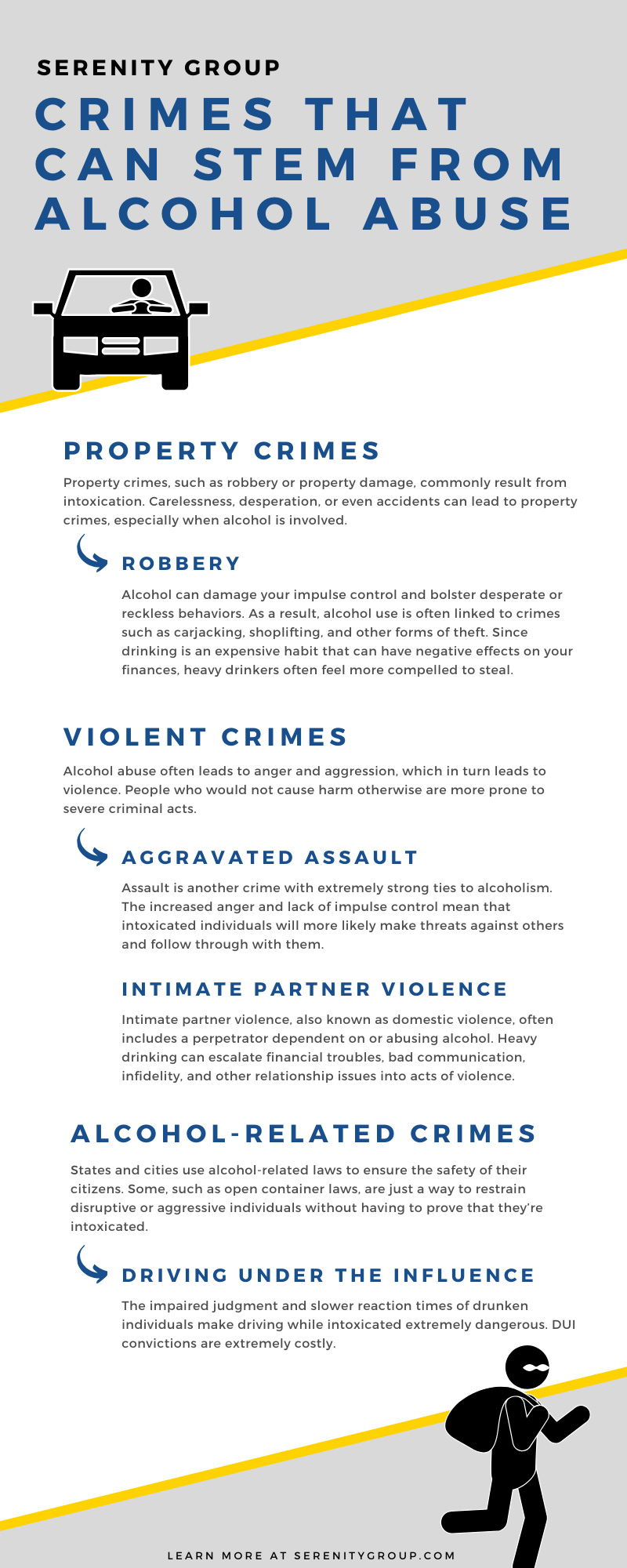Crimes that Can Stem from Alcohol Abuse

Alcoholism, like any addiction, can have some major consequences. Heavy drinking impairs an individual’s judgment, and it increases aggression and other distressing or harmful behaviors. This is why there’s such a strong tie between alcohol abuse and criminal activity. While not all alcohol abusers are criminals, heavy drinking does increase the chances of someone committing a criminal act. We explore some of the most common types of crimes that can stem from alcohol abuse.
Property Crimes
Property crimes, such as robbery or property damage, commonly result from intoxication. Carelessness, desperation, or even accidents can lead to property crimes, especially when alcohol is involved. While the consequences and severity of these actions vary, they always harm both the victims and perpetrators involved.
Robbery
Alcohol can damage your impulse control and bolster desperate or reckless behaviors. As a result, alcohol use is often linked to crimes such as carjacking, shoplifting, and other forms of theft. There is a cyclical nature to alcohol and robbery. Since drinking is an expensive habit that can have negative effects on your finances, heavy drinkers often feel more compelled to steal. Robbery can also quickly turn into a repeated offense, which makes the consequences harsher when you’re caught.
Violent Crimes
Alcohol abuse often leads to anger and aggression, which in turn leads to violence. In fact, alcohol consumption plays a role in 40 percent of violent crimes in the United States. People who would not cause harm otherwise are more prone to severe criminal acts. This is just another way that alcoholism can negatively affect not just the addict’s life, but the lives of everyone around them.
Aggravated Assault
Individuals suffering from alcoholism can experience extreme mood swings. Combined with the aggression of heavy drinking, this can quickly turn into violent acts. One example is aggravated assault, also known as causing serious injury to another individual. Assault is another crime with extremely strong ties to alcoholism. The increased anger and lack of impulse control mean that intoxicated individuals will more likely make threats against others and follow through with them.
Child Abuse
If an individual suffers from alcoholism, so does their family. Just like with other forms of assault, the aggression and impaired judgment that comes with drinking can lead to physical and emotional violence against children. Alcoholism also often leads to child neglect. Like with any addiction, alcohol becomes the most important part of a person’s life, distracting them from their family members. Other stressors of alcoholism—such as losing a job or spending too much money—can also lead to parents ignoring, or otherwise harming, their children. Furthermore, studies show that children who deal with this kind of suffering at a young age are more likely to develop behavioral problems as they grow up, causing the cycle of abuse and crime to continue.
Intimate Partner Violence
Intimate partner violence, also known as domestic violence, often includes a perpetrator dependent on or abusing alcohol. Alcohol abuse can lead to financial troubles, bad communication, infidelity, and other relationship issues. Heavy drinking can escalate these problems into an act of violence. While alcohol abuse is closely tied to intimate partner violence, it doesn’t serve as an excuse. Intimate partner violence is another offense that is often repeated, and it can escalate over time.
Sexual Assault
Sexual assault includes any non-consensual sexual act. While rape is the most severe act of sexual violence, this can also mean non-consensual kissing, touching, or intimate contact of any kind. A large percentage of sexual assaults involve a drunk perpetrator. Like with other forms of assault, the involvement of alcohol may increase aggression and impair judgment, but it doesn’t serve as an excuse for the crime.
Alcohol-Related Crimes
The most obvious crimes that can stem from alcohol abuse are those that directly relate to alcohol. States and cities use alcohol-related laws to ensure the safety of their citizens. Some, such as open container laws, are just a way to restrain disruptive or aggressive individuals without having to prove that they’re intoxicated. Others, such as drunk driving laws, have a vital part in reducing the damage that alcohol can do.
Public Intoxication
Since drunk individuals often get loud, belligerent, or otherwise become a nuisance or danger to themselves and the general public, most places have public intoxication laws. These limit alcohol use to certain businesses or private areas, making it illegal to be visibly drunk in public. Public intoxication, open containers, and similar laws are far less severe than others on this list. In many cases, someone arrested for public intoxication is taken to a jail cell to sober up rather than facing extensive legal consequences. However, this isn’t always the case, and public intoxication—much like alcoholism itself—can often lead to more severe crimes such as harassment, property damage, or assault.
Minor in Possession
Every country has a legal drinking age for a reason. Children and teenagers are still developing mentally, physically, and emotionally. As a result, the effects of alcohol are worse for them. If someone under the legal drinking age is found drunk or in possession of alcohol, they’ll receive a charge for a MIP, or minor in possession. Similarly, it’s also a crime to give alcohol to minors—although some states have exceptions, such as parents or guardians giving alcohol to their older teenagers. While MIPs are also relatively less severe, repeat offenders can face harsher consequences.
Driving Under the Influence
Driving under the influence is, unfortunately, one of the most common crimes that can stem from alcohol abuse. The impaired judgment and slower reaction times of drunken individuals make driving while intoxicated extremely dangerous. In the United States, the legal blood alcohol concentration is .08 percent. If the police catch you driving with a higher blood alcohol concentration, you’ll be charged with driving under the influence. DUI convictions are extremely costly. You might find yourself paying steep court fees, serving time in jail, or facing other consequences such as fines, community service, or a suspended license. You will also likely have to obtain SR22 insurance to reinstate your license.
No matter how severe the crime, or what kinds of consequences you face, alcohol abuse makes you far more likely to do something you will seriously regret. Fortunately, there is always a way to get help. Don’t be afraid to reach out to loved ones or seek a therapist or counselor. If you find yourself needing help after a DUI conviction, contact Serenity Group. We will help you find the best SR22 insurance quotes in California, Maine, and everywhere in between, so you can get back on track and move on with your life.


Recent Comments